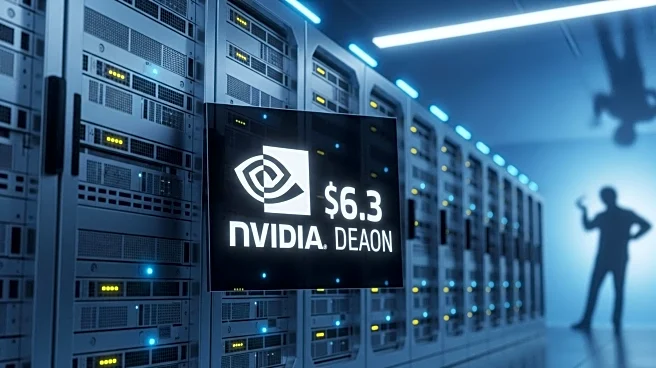What's Happening?
CoreWeave, Inc. has announced a significant agreement with Nvidia, valued at $6.3 billion. This deal ensures that Nvidia will purchase any unsold cloud capacity from CoreWeave until April 13, 2032. The announcement led to an initial rise in CoreWeave's stock by over 9% during premarket trading. However, the stock faced pressure following a report from Kerrisdale Capital, which has taken a short position on CoreWeave shares. Kerrisdale Capital argues that CoreWeave's business model is based on long-term contracts with a few large customers and substantial debt, rather than genuine innovation. They claim CoreWeave lacks unique technology and defensible intellectual property, suggesting a fair value of $10 per share.
Why It's Important?
The deal with Nvidia positions CoreWeave as a key player in the cloud computing sector, potentially boosting its market presence and financial stability. However, the skepticism from Kerrisdale Capital highlights concerns about the sustainability of CoreWeave's business model. If Kerrisdale's assessment proves accurate, it could lead to a significant reevaluation of CoreWeave's stock value, impacting investors and stakeholders. The contrasting views on CoreWeave's future underscore the volatility and uncertainty in the tech industry, particularly for companies reliant on large-scale contracts and debt financing.
What's Next?
CoreWeave's future will likely depend on its ability to expand its customer base and demonstrate innovation beyond its current business model. The company's response to Kerrisdale's claims and its strategic moves to address these concerns will be crucial. Investors and market analysts will be closely monitoring CoreWeave's performance and any further developments in its partnership with Nvidia. Additionally, the broader tech industry may react to this situation, influencing investment strategies and market dynamics.
Beyond the Headlines
The situation raises questions about the role of debt and large contracts in the tech industry's growth strategies. It also highlights the importance of innovation and intellectual property in maintaining competitive advantage. CoreWeave's reliance on Nvidia and a few large customers could pose risks if market conditions change or if competitors offer more innovative solutions. This scenario may prompt discussions on the ethical implications of business models heavily reliant on debt and the potential impact on long-term industry sustainability.









